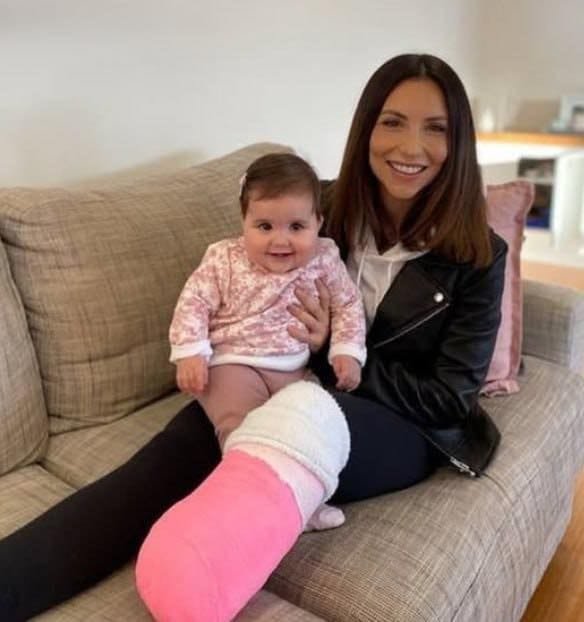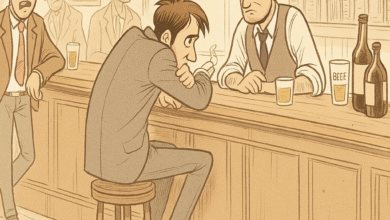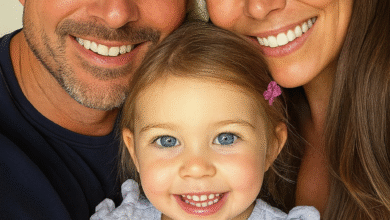In six months, I gave birth, lost my leg, and fought cancer.

Six months ago, I was joyfully setting up the baby’s room—torn between cloth and disposable diapers—when life turned me upside down, not once, but twice.
It all started with a dull ache in my thigh.
At first, I brushed it off as another strange side effect of pregnancy—maybe a pinched nerve—but soon the pain became unbearable.
Still, I pushed through, for my daughter, Liora. I dreamed of soaking in every moment with her: that newborn scent, her tiny fingers curling around mine.
But the pain grew so severe that I could barely rock her during those early morning hours.
Eventually, I went in for a scan.
I’ll never forget the doctor’s face—a mix of solemn regret and difficult truth.
The diagnosis: a rare and aggressive soft tissue cancer that had already spread.
Gripping the hospital bed’s edge, I thought, “I just gave birth. Now cancer is taking everything.”
Chemotherapy started immediately.
My milk dried up, and most nights, I had to hand Liora over to my mother because I was too sick from constant nausea to hold her.
When the cancer invaded the bone in my thigh, the doctors said amputation was my best chance to survive.

I signed the consent forms without tears, determined not to invite pity.
I woke up from surgery missing a leg—and overwhelmed with guilt.
I couldn’t carry my baby or chase her when she began to crawl.
I had even bought a special dress for her naming ceremony—one I would no longer be able to wear.
And still, I’m here.
That was three weeks ago.
I had just started moving again, and Liora’s new little teeth brought unexpected joy.
But this morning, I found something in my medical records that made my heart race: a scan note mentioning a “suspicious lesion in the right lung.”
I had never heard anything about my lungs—the focus had always been on my leg.
Holding the report with trembling hands, I walked across my small living room with my crutches. Should I call my doctor?
His office was closed. The thought of waiting until the next week was unbearable.
What if the cancer had spread again?
The following days blurred into sleepless nights and spiraling thoughts.
In the middle of it all, Liora’s bright eyes and drooly smile anchored me.
Every time I fed her, pressing my face gently to hers, I tried to quiet my racing mind.
When exhaustion hit, my mother stepped in. But I knew she was scared too.
I kept telling her I was okay—unwilling to add more weight to the burdens we already carried.
Then came the day of the hospital meeting.
The antiseptic smell was overwhelming as I rolled through the halls in my wheelchair. My stump still sore from therapy, crutches were impossible for long distances.
In the silence of Dr. Armitage’s office, I exhaled.
“I saw a note about a nodule in my right lung. Is it cancer? Why didn’t anyone tell me?”
His face—serious but gentle—broke my heart.
“I was waiting for confirmation before alarming you,” he said softly. “There’s a small spot on your lung, but we don’t know yet if it’s malignant.”
The word malignant hit me like a blow. Still, I forced myself to stay calm.
Another scan was scheduled. If necessary, a biopsy would follow.
Over the next few days, I clung to some sense of normalcy, focusing on Liora’s daily rhythm.
But every giggle, every outstretched hand, stirred fear—what if I’m not here to see her grow up?
Physical therapy became my refuge. I was determined to master my prosthetic leg.
It was there that I met Saoirse—a woman who had lost her leg in a car accident years ago.
Poised, calm, and strong, she taught me tricks to balance, turn, and ease nighttime pain.
More importantly, she shared her story: a single mother who endured unimaginable loss and still fought for her son’s future.
“Keep your heart open,” she told me one afternoon as we walked past mirrored walls.
“Kindness will surprise you. And you’ll surprise yourself with how strong you really are.”
I listened closely, taking in every word.
The day of my new scan arrived.
My mother and aunt drove me in silence, our car filled with unspoken fears.
In the waiting room, the smell of disinfectant and the hum of machines amplified my anxiety.
“I’m not ready for another round of chemo,” I whispered to my mom, terrified my body wouldn’t survive it.
“No matter what happens, we’ll go through it together,” she said, squeezing my hand.
When Dr. Armitage finally came out holding a folder, I braced myself for the worst.
Then he said:
“Good news—the spot on your lung is stable and, from what we can tell, it’s not harmful. We’ll continue to monitor it, but it doesn’t look like the cancer has spread.”
In that moment, a strange mix of relief and disbelief washed over me—my lips trembled into a smile as tears streamed down, my mother wrapping me in her arms.
Though my body still trembled, I felt surrounded by hope.
In the days that followed, I threw myself into rebuilding.
Learning to walk with my prosthetic leg was painful, but every step felt like reclaiming a piece of my life.
Morning stretches eased the lingering aches, and gentle massages at night brought comfort to my stump.
Gradually, I began to lift Liora again—a moment that filled my heart with indescribable joy.
One sunny morning, as I rocked her gently, her laughter and soft touch on my cheek reminded me that she loved me unconditionally—scars, prosthetic, and all.
To celebrate this new beginning, we threw a small “victory party.”
My mom baked a vanilla cake with bright pink filling, and a few close friends, along with my therapist and Saoirse, joined us with balloons and flowers.
We raised glasses of lemonade in a quiet toast—to life, to strength, and to cherishing the small things we often take for granted.
That night, as I tucked Liora into bed and watched her peaceful face, I reflected on how far we had come in just six months.
The nursery—once decorated with soft rainbows and elephants—now stood as a monument to our journey: a story of pain, resilience, and love.
Life flipped me more than once. But here I am—holding my daughter, body and soul—ready for whatever comes next.
Every time I look into Liora’s eyes, I remember that love and hope are more powerful than any illness.
My story is proof.
If it touched your heart, share it with someone who might need a reminder that even when life breaks you down—there’s still strength to rebuild.





